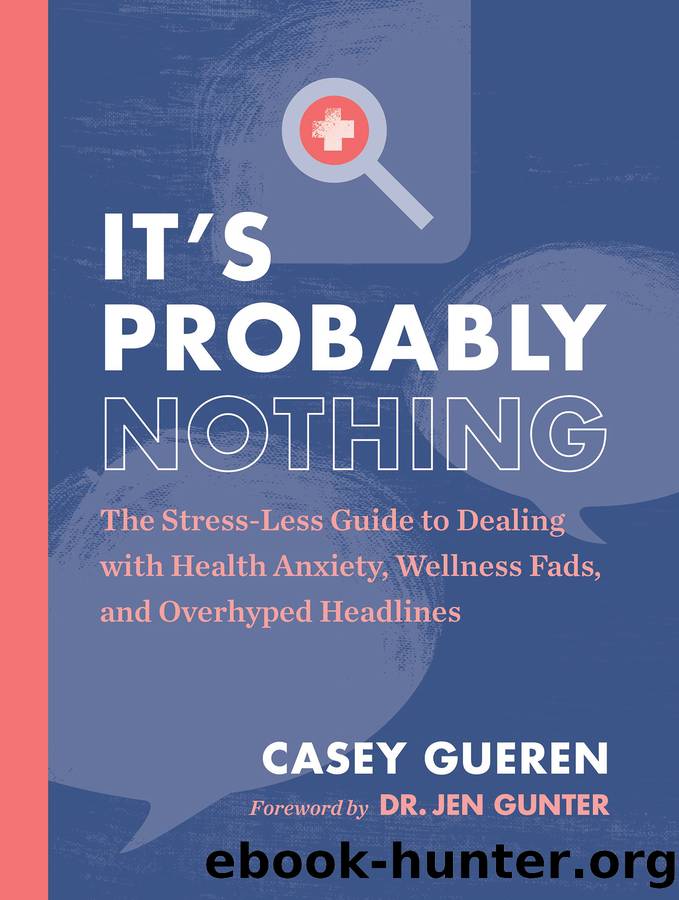It's Probably Nothing: The Stress-Less Guide to Dealing With Health Anxiety, Wellness Fads, and Overhyped Headlines by Casey Gueren

Author:Casey Gueren [Gueren, Casey]
Language: eng
Format: epub
ISBN: 9780762471836
Google: qbAhzgEACAAJ
Publisher: Running Press
Published: 2021-10-05T00:13:58.199522+00:00
LEARN HOW TO PUT YOUR THOUGHTS ON TRIAL.
So how do you know the difference between intuition and anxiety when it comes to something feeling off in your body? I realize that itâs not enough to say that sometimes a lot of miserable symptoms are not going to point to something concrete, diagnosable, or treatable. That sucks. We want answers!
Hereâs the thing⦠there is no super simple secret way to figure that out. I really hope you werenât expecting there to be, because Iâd hate to disappoint you. But this also doesnât mean that you canât try to get closer to the truth. To do that, you have to go all Judge Judy on your ass, or⦠your vagina, or whatever body part is stressing you out at the moment.
You have to challenge yourself like Judge Judy confronts a plaintiff who doesnât seem to be telling the whole story. You have to get all the facts, look at all the evidence, cross-examine the witness. (Guys, I have no idea how courts work.) Basically, you have to put your thoughts on trial. According to Abramowitz, this technique is actually part of the approach used in cognitive behavioral therapy (CBT), often considered the gold standard of treatment for anxiety, OCD, and related disorders.
It might seem ridiculous at first. You might be saying, âUm, I know what I know.â Fair. And I have no doubt that you have been paying attention to your body and you do know whatâs going on in there. But this is also true: We are often very unreliable experts. We forget stuff. We misremember shit. We overestimate risk. Weâre rife with biases. Weâre quick to connect the dots in ways that donât always make sense but seem convenient, and some of us donât even know our vaginas from our vulvas. We may be the experts of our own bodies, but we are not always reliable narrators of what goes on inside of them. Hence, trial.
Letâs say youâve been noticing some random spotting and discomfort lately and youâre freaking out that it could be something serious, like cervical cancer. Your first urge is to Google âcervical cancer symptoms,â cross-reference all of your own symptoms with the information that pops up, look up the prevalence of cervical cancer in people your age, decide that you can definitely be one of the 8 in 100,000 women diagnosed with cervical cancer each year, and continue to go down a rabbit hole of information that tells you about diagnosis, treatment, prognosis, etc.32 Tell me, are you calmer now? Yeah, didnât think so. Letâs rewind and try that again.
So youâve been noticing some random spotting and discomfort lately and youâre freaking out that it could be something serious, like cervical cancer. Now, if youâre someone who tends to get anxious about their body, usually overestimates their risk for serious diseases, and can spend the better part of an evening searching their symptoms, Iâm going to suggest you try putting your thoughts on trial before you turn to the internet.
Download
This site does not store any files on its server. We only index and link to content provided by other sites. Please contact the content providers to delete copyright contents if any and email us, we'll remove relevant links or contents immediately.
Spare by Prince Harry The Duke of Sussex(5181)
Machine Learning at Scale with H2O by Gregory Keys | David Whiting(4295)
Fairy Tale by Stephen King(3370)
Will by Will Smith(2911)
The Bullet Journal Method by Ryder Carroll(2561)
Hooked: A Dark, Contemporary Romance (Never After Series) by Emily McIntire(2550)
Rationality by Steven Pinker(2352)
It Starts With Us (It Ends with Us #2) by Colleen Hoover(2345)
Can't Hurt Me: Master Your Mind and Defy the Odds - Clean Edition by David Goggins(2324)
Friends, Lovers, and the Big Terrible Thing by Matthew Perry(2219)
The Becoming by Nora Roberts(2189)
Love on the Brain by Ali Hazelwood(2062)
A Short History of War by Jeremy Black(1843)
The Strength In Our Scars by Bianca Sparacino(1841)
HBR's 10 Must Reads 2022 by Harvard Business Review(1840)
Leviathan Falls (The Expanse Book 9) by James S. A. Corey(1727)
A Game of Thrones (The Illustrated Edition) by George R. R. Martin(1724)
515945210 by Unknown(1662)
Bewilderment by Richard Powers(1609)
